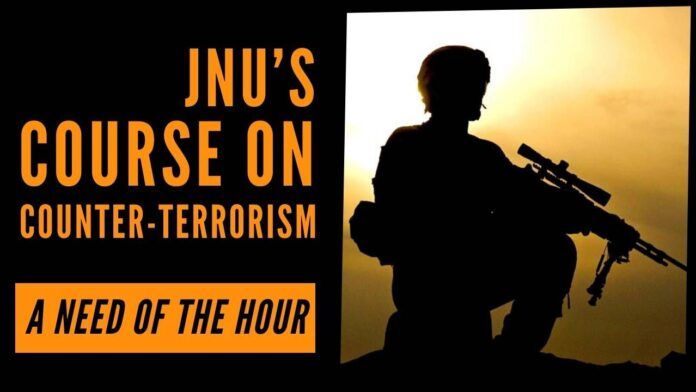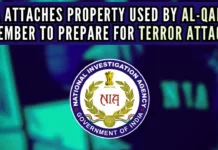
Counter-terrorism courses: Need of the hour not only at JNU but other places of learning in India
India has been a target of cross-border terrorist activities for decades which have thankfully diminished during recent years. However, the evolving turmoil in the Taliban’s Afghanistan due to a swift withdrawal of the U.S. forces, a failed foreign policy of monumental magnitude in my view, has created a huge potential for a surge in terroristic activities globally but India, in particular.
I am appalled that the proposed JNU (Jawaharlal Nehru University) course titled “Counter-Terrorism, Asymmetric Conflicts, and Strategies for Cooperation.” was welcomed in the media with headlines ‘jihadi violence’ is the only form of ‘fundamentalist religious terror’ in Indian Express (IE) on August 30[1]. I must question journalism ethics in deconstructing the course modules selectively and use the only phrases that incite and create sensationalism. In a country like India where secularism has been beaten to death by the media and for political purposes by the left, right, and center, the headline phrases above are nothing but adding fuel to the fire. I ask if that is objective journalism or merely an effort to raise undue controversy without an in-depth analysis?
I am appalled that the proposed JNU (Jawaharlal Nehru University) course titled “Counter-Terrorism, Asymmetric Conflicts, and Strategies for Cooperation.”
India always needed a trained workforce in counter-terrorism but the current events make it more critical than ever before. I commend the JNU faculty for their very timely course development on counter-terrorism. As an academic with a physics/ engineering background and about 40 years of experience as faculty and academic administrator in the U.S., the curriculum development and its content are the sacred domains of faculty under a widely acclaimed principle of “Academic Freedom.” I cannot imagine that Indian institutions are/ should be any different.
Let me first attempt to deconstruct and understand ‘jihadi violence’ in the broader context and in relation to the course. I believe that ‘jihad’ is of Arabic origin meaning a “struggle” or “striving.” Then, it is a matter of interpretation by clerics and those practicing it in the ugliest form of violence. Regrettably, in recent history, it is manifested as a holy war and/ or vigorous crusade for a particular ideology. While I agree that every Muslim does not subscribe to the negativity associated with Jihad, but we can’t deny that the more radicalized Muslims do. I don’t want to get in the who and where the more radicalized people are but they are widely spread causing global threats.
The present controversy about the course appears to be rooted in the IE reporter asking the course designer “about the reference to only one religion in the module on “fundamentalist-religious terrorism” and the response, “because Islamic terrorism is a world-accepted thing. After the Taliban, it has gained momentum now.”
I assert that the JNU Professor in question did not state anything that is out of the ordinary, and not known/ witnessed the world over including two gruesome acts of terrorism on September 11, 2001, in the U.S. and September 26, 2008, in India. It will be hard to cite acts of terrorism that were not associated with the radical groups of one particular religion practicing jihad or similar ideology be it Taliban, Al Qaeda, ISI, etc. Unfortunately, the most common denominator about the people resorting to violence is their Islamic faith which admittedly does not teach only violence. Closer to India’s homeland, can it be denied that almost all cross-border incursions and domestic incidence of terrorism, large and small, have their origin in jihad-led ideology?
Where journalism has failed is not realizing and recognizing that the learning has to be built on what we know or have experienced. It is followed by discussion, debate, research, and asking questions (inquiry) to separate myths, fiction, and fake news from reality, truth, facts, etc. It is the essence of academic freedom for faculty and students alike that they teach/ learn without undue external influences. The journalists covering academia must take academic freedom to heart before making a politically charged mountain out of an academic mole. I applaud the JNU faculty for speaking the facts as it should be under academic freedom.
In fact, the counter-terrorism course title is extremely well thought out and timely. In my informed opinion from afar, similar courses are the need of the hour not only at JNU but other places of learning in India. The salient feature is that the course is not required but is optional for JNU students. I could be wary if it was although India needs more informed and educated students who understand at least the basics of counter-terrorism in the interest of national security. No nation including India can secure its borders and maintain domestic peace and stability against increasing threats without the trained workforce for civilian law and order and security.
It is also important to cite a follow-up IE headline, “Needless controversy—” on September 2 in which JNU Vice-Chancellor has stated that the course is “holistic” and has been approved by the Academic Council, He went on to suggest that the course would give students “broad-based knowledge” of the subject[1]. I could not agree more and I hope the controversy will be laid to rest. I must also admire India’s Education Minister being very vocal in supporting the course. He went on to say if MIT can discuss counter-terrorism measures, why can’t an Indian university do the same? It is time that we begin to recognize and reward our own intellectuals in academia, particularly, those putting national interest on the front and center.
In conclusion, it is my assessment that the recent developments in India’s neighboring country i.e., the Taliban coming full circle in the last 20 years certainly pose a significant threat to India and globally. It is also chilling that those running Afghanistan under Taliban leave no ambiguity that jihadism is back in full swing.
It is very refreshing that JNU faculty and the academic council are responding to national needs in a more constructive, positive, and timely manner which in the past was in the news for the wrong reasons. I have no doubts that the course in question will prepare the students well from the local to more global examples of acts of terrorism, its perpetrators, and various strategies to deescalate and counter it.
Note:
1. Text in Blue points to additional data on the topic.
2. The views expressed here are those of the author and do not necessarily represent or reflect the views of PGurus.
References:
[1] In new JNU course, ‘jihadi violence’ is only form of ‘fundamentalist religious terror’ – Aug 30, 2021, Indian Express
[2] Needless controversy over new counter-terrorism course, syllabus holistic: JNU Vice-Chancellor – Sep 02, 2021, Indian Express
- Education and election in Bharat: Race to the top - April 16, 2024
- Kejriwal: “An Insignificant Man” or a corrupt politician with impending prison term - March 24, 2024
- Bharat’s general elections and the Model Code of Conduct - March 22, 2024











I support JNU’s course on counterterrorism. Knowledge is the supreme purifier. We must launch a global effort to counter extremism through education and the media. We must remove hate material from curricula and teach tolerance, critical thinking, how to counter extremist propaganda, and how to decipher the credibility of information seen or received through mainstream and social media. The benefits of this approach would extend to countering all forms of extremism. To some extent, modern terrorism is media terrorism. The media are attracted by extreme terrorist acts because they must report on any major event and because the dramatic and spectacular aspect of terrorism fascinates the general public. Today’s terrorists exploit this and act in a way that will attract maximum attention around the world.
Very well articulated, Bansi Pandit Ji.